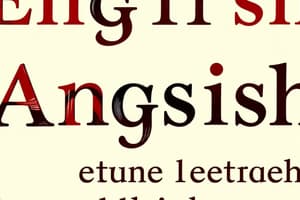Podcast
Questions and Answers
What describes a compound sentence?
What describes a compound sentence?
- One independent clause.
- One independent clause and at least one dependent clause.
- Two independent clauses joined by a conjunction. (correct)
- Two or more independent clauses and at least one dependent clause.
Which of the following is an example of a suffix?
Which of the following is an example of a suffix?
- -ness (correct)
- Re-
- Over-
- Un-
Which genre includes novels and short stories?
Which genre includes novels and short stories?
- Fiction (correct)
- Non-fiction
- Biography
- Poetry
What is a phoneme?
What is a phoneme?
Which part of speech describes nouns?
Which part of speech describes nouns?
What punctuation mark indicates the end of a declarative sentence?
What punctuation mark indicates the end of a declarative sentence?
Which of the following represents a synonym?
Which of the following represents a synonym?
What is the primary challenge faced by non-native speakers learning English?
What is the primary challenge faced by non-native speakers learning English?
Flashcards are hidden until you start studying
Study Notes
English Language Overview
- Origin: Developed from Anglo-Saxon (Old English) with influence from Norse, Latin, and French.
- Family: Part of the Germanic branch of the Indo-European language family.
- Dialects: Numerous dialects worldwide, including British English, American English, Australian English, and others.
Grammar
-
Parts of Speech:
- Nouns: Person, place, thing, or idea.
- Verbs: Action or state of being.
- Adjectives: Describe nouns.
- Adverbs: Modify verbs, adjectives, or other adverbs.
- Pronouns: Replace nouns.
- Prepositions: Show relationships between nouns and other words.
- Conjunctions: Connect words, phrases, or clauses.
-
Sentence Structure:
- Simple: One independent clause.
- Compound: Two independent clauses joined by a conjunction.
- Complex: One independent clause and at least one dependent clause.
- Compound-Complex: Two or more independent clauses and at least one dependent clause.
Vocabulary
-
Word Formation:
- Prefixes: Added to the beginning of a word (e.g., unhappy).
- Suffixes: Added to the end of a word (e.g., kindness).
- Compound Words: Formed by combining two words (e.g., toothpaste).
-
Synonyms and Antonyms:
- Synonyms: Words with similar meanings.
- Antonyms: Words with opposite meanings.
Phonetics and Phonology
- Phonemes: The smallest unit of sound in a language.
- Vowels and Consonants:
- Vowels: A, E, I, O, U (and sometimes Y).
- Consonants: All other letters in the alphabet.
Writing Systems
- Alphabet: Consists of 26 letters (A-Z).
- Punctuation: Marks that define sentence structure and meaning (e.g., periods, commas, question marks).
Literature
-
Genres:
- Fiction: Novels, short stories.
- Non-fiction: Biographies, essays, articles.
- Poetry: Forms include sonnets, haikus, free verse.
-
Key Literary Devices:
- Metaphor: A comparison without using "like" or "as."
- Simile: A comparison using "like" or "as."
- Alliteration: Repetition of initial consonant sounds.
Language Function
- Communication: Used for expressing thoughts, emotions, and ideas.
- Cultural Influence: English is a global lingua franca, used in business, science, and academia.
English as a Second Language
- Learning Challenges: Pronunciation, idiomatic expressions, and phrasal verbs can be difficult for non-native speakers.
- Teaching Methods: Immersive approaches, grammar-translation, communicative language teaching.
Global Variations
- Accent and Dialect: Distinction between regional pronunciation and variations in word usage.
- Standard English vs. Colloquial: Standard English refers to formal usage; colloquial is informal language patterns.
English Language Origins
- English is part of the Germanic branch of the Indo-European family.
- Developed from Old English (Anglo-Saxon) with influences from Norse, Latin, and French.
English Grammar
- Uses eight parts of speech including nouns, verbs, adjectives, adverbs, pronouns, prepositions, conjunctions, and interjections.
- Builds sentence structures based on four types: simple, compound, complex, and compound-complex.
English Vocabulary
- Utilizes prefixes (added to the beginning of a word) and suffixes (added to the end of a word) to create new words.
- Forms compound words by combining two words.
English Phonetics & Phonology
- Composed of phonemes which are the smallest unit of sound.
- Uses vowels (A, E, I, O, U, and sometimes Y) and consonants.
English Writing Systems
- Uses the alphabet (A-Z) and marks punctuation (periods, commas, question marks) for structure and meaning.
English Literature
- English literature is categorized into genres like fiction (novels, short stories), nonfiction (biographies, essays, articles), and poetry (sonnets, haikus, free verse).
- Employs various literary devices including metaphors, similes, and alliteration.
English Language Function
- Serves as a communication tool for expressing thoughts, emotions, and ideas.
- Acts as a global lingua franca used widely in business, science, and academia.
ESL Learning Challenges
- Non-native English speakers face pronunciation, idiomatic expressions, and phrasal verb challenges.
Global Variations in English
- Accents and dialects exist as variations in regional pronunciation and word usage.
- Standard English is used in formal settings, while colloquial English is informal language.
Studying That Suits You
Use AI to generate personalized quizzes and flashcards to suit your learning preferences.




